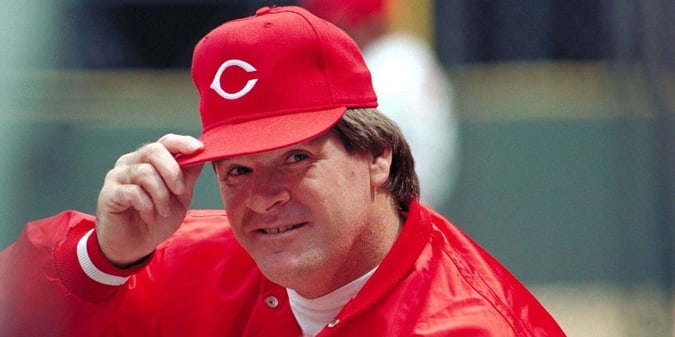Pete Rose, ‘Shoeless’ Joe Jackson Among Those Posthumously Removed from MLB Ineligible List

Pete Rose, seen here from his management days with the Cincinnati Reds, is finally enjoying the recognition Major League Baseball long fought to deny him. (Photo: Michael Williams / ZUMA Press)
Major League Baseball Commissioner Rob Manfred announced Tuesday that 17 individuals had been posthumously removed from the permanently ineligible list, making those deceased individuals now eligible for induction to the Baseball Hall of Fame.
The most prominent person removed from the list was Pete Rose, the former Cincinnati Reds player and manager who accepted a permanent ban from baseball in 1989.
Rose No Threat to MLB Integrity After Death, Manfred Says
Rose, who is the all-time MLB leader in hits, accepted the decision after an MLB investigation found that he had bet on baseball games – including on his own team to win – while managing the Reds.
In a letter to Rose family attorney Jeffrey M. Lenkov, who had petitioned to remove Rose from the ineligible list following his death on Sept. 30, 2024, Manfred outlined his reasoning for the decision.
“Obviously, a person no longer with us cannot represent a threat to the integrity of the game,” Manfred wrote. “Moreover, it is hard to conceive of a penalty that has more deterrent effect than one that lasts a lifetime with no reprieve.”
Despite his negative association with gambling, Rose didn’t shy away from the gaming industry following his ban from baseball. In the many years after his retirement, Rose became one of the most active veterans signing autographs at baseball card shows and other events. That included frequent appearances at Las Vegas casinos, where some obituaries said he spent upwards of 20 hours a week interacting with fans.
But Rose was far from the only prominent MLB figure reinstated as a part of Manfred’s decision. “Shoeless” Joe Jackson and the seven other members of the Chicago White Sox who were banned from baseball in 1921 have also been taken off the permanently ineligible list.
Rose, Jackson Now Have Path to Baseball Hall of Fame
Those eight players were banned by the first MLB commissioner, Kenesaw Mountain Landis, for participating in a scheme to fix the 1919 World Series. The White Sox lost that best-of-nine series five games to three after being paid by gamblers to drop the series as heavy favorites. The story was immortalized in the book and film “Eight Men Out.”
Jackson was the offensive star of the team, and given his .375 average in the World Series (including the series’ only home run), many have suggested that he may not have been in on the fix – though it has also been pointed out that much of his production came in games the White Sox won, or when games were out of hand. Banned from baseball after the 1920 season – one of the most productive of his career – Jackson retired with a career .356 batting average.
Both Rose and Jackson have been widely regarded as surefire Hall of Famers strictly in terms of their on-field accomplishments in their respective eras. Eddie Cicotte, a starting pitcher for the 1919 White Sox, also has a resume that could garner Hall of Fame consideration.
Getting into the Hall of Fame, however, will be a multistep process. First, the Historical Overview Committee will draft a list of eight names for the next Classic Baseball Era Committee, which will next vote on the induction of players who primarily played before 1980 in December 2027.
At that point, Rose, Jackson, or any other newly eligible players would need to receive 12 of 16 votes from the committee – where individuals may consider their off-the-field conduct in conjunction with their baseball resumes. If they earn the needed votes, they could join the Baseball Hall of Fame as part of the 2028 class.
Meet The Author
Experience
Ed Scimia is an experienced writer who has been covering the gaming industry since 2008. He graduated from Syracuse University in 2003 with degrees in Magazine Journalism and Political Science. As a writer, Ed has worked for About.com, Gambling.com, and Covers.com, among other sites. He has also authored multiple books and enjoys curling competitively, which has led to him creating curling-related content for his YouTube channel, "Chess on Ice."
Read Full BioRelated News








